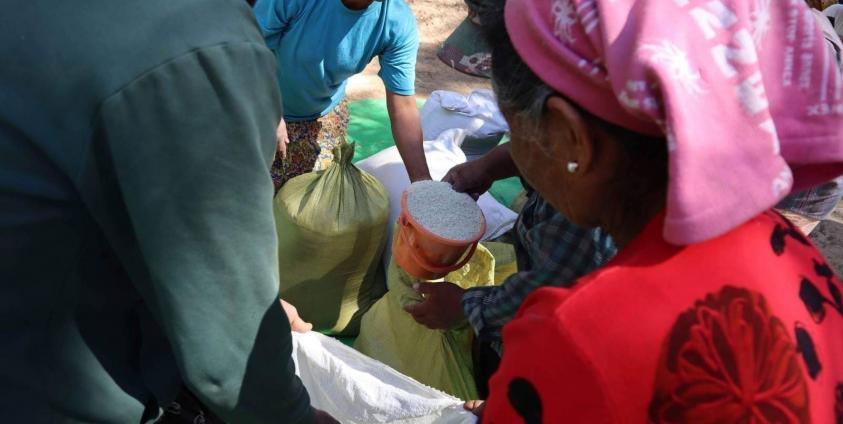According to U Banyar, who is in charge of the humanitarian committee of the Karenni State Consultative Council (KSCC), a mere 5% of the humanitarian aid that passes through the hands of the Military Council, actually reaches refugees in Karenni State.
U Banyar, who is in charge of the humanitarian committee of the KSCC said “The situation is very clear. After cooperating with the regime in the areas under Military Council control , only 5 percent of the aid we deliver will be accessible to the IDPs. The remaining 90 to 95% never reaches them.Therefore it is pointless to discussing the efficacy. If only 5% is accessible, it is simply ineffective.”
Since May 2022, the World Food Program (WFP) has been the primary provider of food support to the residents of Loikaw in Karenni State, and some of the WFP’s rice has reached the local market stores.
According to Mr. Stephen Anderson, a representative of the World Food Programme (WFP) in Myanmar, IDPs in Karenni State often exchange the rice supplied by the WFP for other essential items. When asked by the Kantarawaddy Times on February 6, Mr. Stephen Anderson, explained that some beneficiaries choose to sell their rice rations in times of emergency or urgent needs, such as healthcare and education for their children.
U Banyar, who is in charge of the humanitarian committee of the KSCC, has stated that the approximately 20 organizations providing aid only via the Military Council in Karenni State , must establish other channels for aid delivery ,by making contact with humanitarian aid efforts in arears controlled by ethnic armed groups and enhance their humanitarian aid efforts.
On March 8, International Women’s Day, the women's forces of Karenni State released a statement urging an end to negotiations with the Military Council for humanitarian aid and instead, to establish official connections with local social organizations.
“ The aid of local and foreign organizations that are helping on a daily basis, also needs to reach
the women and children fleeing the war. Therefore, rather than cooperating with the Military Council to reach them, it would be more effective if we formally connect with the local organizations working in our states. Then it will be more effective and beneficial for the people,” said Maw Pray Myar, the second secretary of the Karenni Women’s Organization (KNWO).
After almost two years of avoiding war in Karenni State, the need for humanitarian assistance is growing. There are approximately 70 social organizations in Karenni providing aid to IDPs, and currently the IDPs are primarily reliant on donated food. According to aid workers, some refugee families are facing a shortage of rice as the number of donors has decreased over time.
“We are facing significant shortages. Here a bag of rice costs at least 70,000 kyats. Given the situation, we need to assess whether we can provide additional assistance and also monitor the inflow of donors,” stated one of the aid workers. The delivery of food to IDPs is facing obstacles as the aid must pass through checkpoints controlled by the Military Council, and road closures caused by the intensification of fighting,” according to reports.
In 2022, only a few areas in Loikaw, Demoso, and Hpruso are able to grow rice, which represents less than 35 percent of the entire province’s rice-growing acreage. Nearly 200,000 IDPs in Karenni have been avoiding the war for nearly two years, and the ability to cultivate rice has declined during this time.







